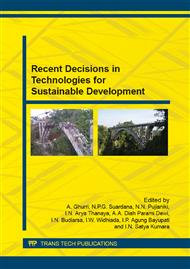p.80
p.87
p.95
p.101
p.108
p.114
p.121
p.127
p.133
Conceptual Framework of Bidding Strategy in Order to Improve Construction Project Performance
Abstract:
Globalization makes the competition ofconstruction is increasingly tight. The competitors faced not only in the regional district/city, province, but increasingly widespread, even cross the country worldwide. Bidding strategy is an important factor that improves competitiveness. It defines as a management skills of using all available resources both physical and financial, in order to offer a comprehensive and competitive bidding. The bidders usually considervarious aspects, including internal, external and environment, with aim to win the bidding competition, and provide maximum project performance.The literature review method is used to create ideas, and synthesize the relatedresearches which have been done previously.This paperaimstodevelop aframeworkthatcanbe usedforevaluationin the early stagesof project selection, basedon theriview of variousliteraturerelated tobidding strategiesandproject performance. The result from the literature riviewconcerning are presented, and a conceptual framework of bidding strategy model is developed.
Info:
Periodical:
Pages:
108-113
DOI:
Citation:
Online since:
July 2015
Authors:
Keywords:
Price:
Сopyright:
© 2015 Trans Tech Publications Ltd. All Rights Reserved
Share:
Citation:


